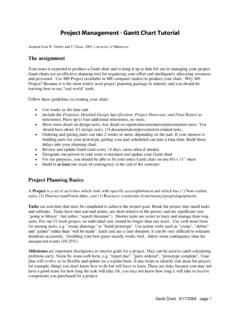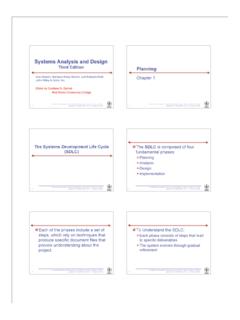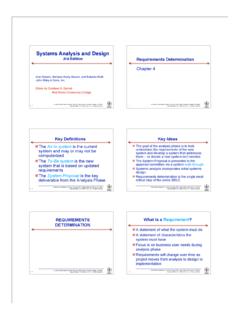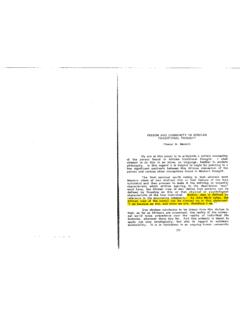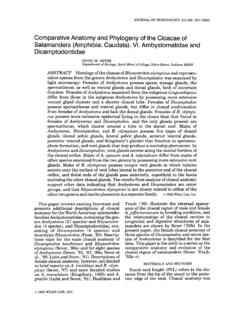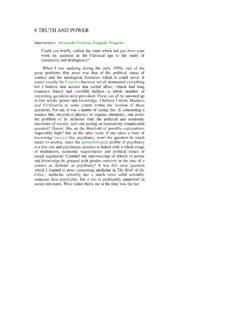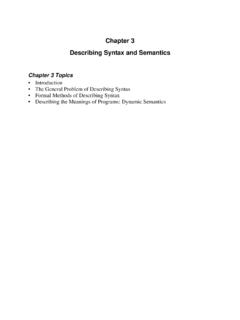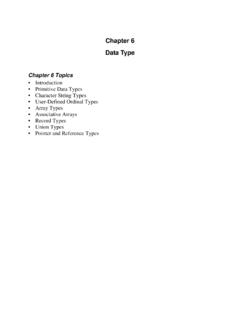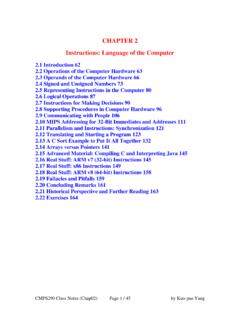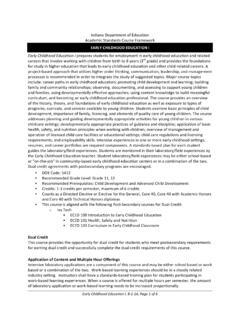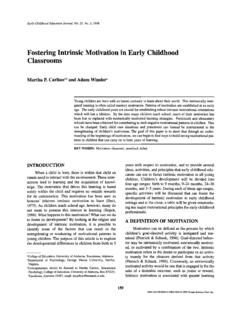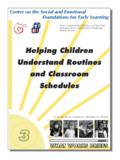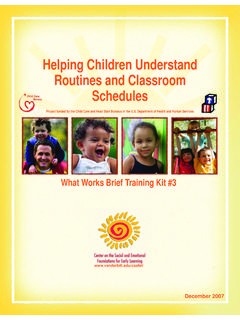Transcription of ECE 400: Curriculum and Instruction in Early Childhood ...
1 1 ECE 400: Curriculum and Instruction in Early Childhood education (Preschool and Kindergarten) 4 hours lecture/4 hours field work per week Generic Syllabi Prerequisites: EDUC 320, EDUC 323, and Full SARTE status Required Textbooks: Bredekamp, S., & Copple, C. (Eds). (1997). Developmentally appropriate practice in Early Childhood programs. (Rev ed). Washington, DC: National Association for the education of Young Children. Henniger, M. (2005). Teaching young children: An introduction. (3rd ed.). Upper Saddle River, NJ: Pearson education , Inc. Keller, G. (2007). Southeastern Louisiana University Field Experience Student Handbook. Recommended Textbook: Dodge, D.
2 , Colker, L., & Heroman, C. (2002). The creative Curriculum for preschool. (4th ed). Washington, : Teaching Strategies, Inc. Course Description: Development of Curriculum and instructional practices in the preschool and kindergarten settings; principles and methods of understanding and working with the preschool child. Course Overview: The Early Childhood profession is responsible for establishing and promoting standards of high quality professional practice in Early Childhood programs. These standards must reflect current knowledge and shared beliefs in what constitutes high quality, developmentally appropriate Early Childhood education in the context within which services are delivered.
3 The purpose of this course is to learn about the basic developmental stages of children and how to apply this information appropriately to Instruction and Curriculum development in practical settings. An integral part of this course is to provide students with the opportunity to develop skills related to developing appropriate Curriculum . As students gain a broader understanding of young children, this knowledge will be reflected in their Curriculum planning. The information in this course will be presented in a format that provides students with a global understanding of the rich diversity of all children. Statement of Conceptual Framework: In order to successfully plan, develop, and implement curricula to meet the needs of diverse learners in today s world and to prepare candidates for the future, the College of education and Human Development (COEHD) has identified four critical components of The Effective Educator: Professional Standards (PS), Knowledge of Learner (KL), Strategies and Methods (SM), and Content Knowledge (CK).
4 The Conceptual Framework provides direction for the 2development of effective professionals. Diversity is an integral part of each component, and Technology is emphasized throughout all programs in the educational unit. Student Learning Objectives: 1. Recognize characteristics of an effective Early Childhood educator and effective Early Childhood program. (PS) (SM) 2. Demonstrate knowledge of child development, characteristics of the young child, and developmentally appropriate practices. (KL) (PS) 3. Show knowledge of the history of Early Childhood education and its impact on current practices in the field. (PS) (SM) 4. Exhibit knowledge of various appropriate assessment techniques.
5 (SM) 5. Select and create appropriate materials for an Early Childhood classroom . (SM) 6. Demonstrate knowledge of valid classroom management techniques. (SM) 7. Develop an integrated teaching unit appropriate for the Early Childhood level. (PS) (KL) (SM) (CK) 8. Recognize special needs in children and demonstrate knowledge of how to meet these needs. (SM) 9. Demonstrate knowledge of how to involve parents in the classroom . (SM) 10. Demonstrate knowledge of needs of children from multicultural backgrounds and how to meet those needs. (SM) 11. Demonstrate ability to observe, plan, teach, and evaluate developmentally appropriate activities provided for children in an Early Childhood setting.
6 (PK) (KL) (SM) (CK) 12. Investigate current research in the field of Early Childhood education . (PK) 13. Identify and incorporate opportunities to address performance indicators for technology-literate children in Early Childhood settings. (SM) 14. Identify and address state and national standards for Early Childhood education and content areas as developmentally appropriate practices for Early Childhood education . (PK) Suggested Assessment Strategies: The above objectives will be assessed through the following strategies: A. Mastery of content is assessed via objective exam. B. Assessor rates products produced for demonstration using predetermined rubric. C. Assessor rates lesson plans using predetermined rubric.
7 D. Assessor rates field experiences using predetermined rubric. E. Candidate self-assesses academic growth through reflecting on field experiences and class assignments. Course Requirements: 1. Class Participation: Your class attendance, interaction, and participation are required. In-class activities will be scored with participation points, and may not be made up. If something unexpected occurs and you are unable to come to class, it is your responsibility to contact me as soon as possible through email to explain. If you miss class it is your responsibility to find out what was missed or to get copies. 32. Materials needed: Every class meeting at SLU you will need to bring the textbook we will be using that day and the following supplies: Water color markers, water colors and paint brush, scissors, glue, pen, pencil, crayons a can of play doh and a notebook for writing reflections.
8 You will need your textbook and these supplies to be able to participate in class activities. 3. Code of Ethics Paper: Prepare a 3-5 page paper that summarizes your understanding of the Code. Describe the Code in your own words and explain what it means to you and your plan to be a future Early Childhood educator. 4. History of Early Childhood education Paper Prepare a 3-5 page paper that clearly showcases your understanding and knowledge of the history of Early Childhood education . Identify one individual or Early Childhood educational program that you believe significantly influenced your educational philosophy and discuss in depth. Include the contributions this individual made to the field and discuss the specific ways this person or program has influenced you and your philosophy of Early Childhood education .
9 5. Developmentally Appropriate Practices Report: Prepare a report that the describes developmentally appropriate practices in an Early Childhood setting. 6. Lesson Plans/Activity Plans: These are copies of plans and descriptions of materials prepared for the field experience portion of ECE 400. You need to use the form required by Southeastern when completing lesson plans. There will be 12 daily lesson plans due and two ten-day block lesson plans. The block lesson plan will be a part of your integrated unit plan. You will be provided a lesson plan format, which will include an assessment component to evaluate evidence of student learning. Emphasis will be placed on writing lesson plans, which reflect implementation of developmentally appropriate practice, integration of concepts, and incorporation of multiple teaching strategies.
10 Teacher candidates will work in groups of 2 or 3 in writing lesson plans. During the field experience, you will be working with your mentor teacher to collaborate on the strategies and skills that will be included in your lesson plans. You will develop two integrated units that incorporate developmentally appropriate activities for each developmental domain. This unit will be implemented during your block weeks. It is important that you work closely with your mentor teacher to make sure your unit fits in well with the planned lessons for the block weeks. You need to discuss your lesson plan with your mentor teacher prior to turning it in for grading. After the instructor provides feedback, and grades the lesson plan, you will need to make any necessary corrections and provide a copy to your mentor teacher.
